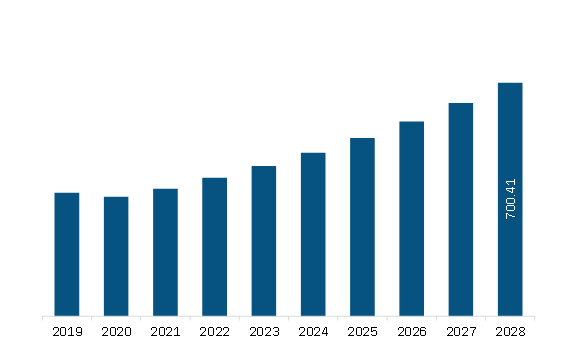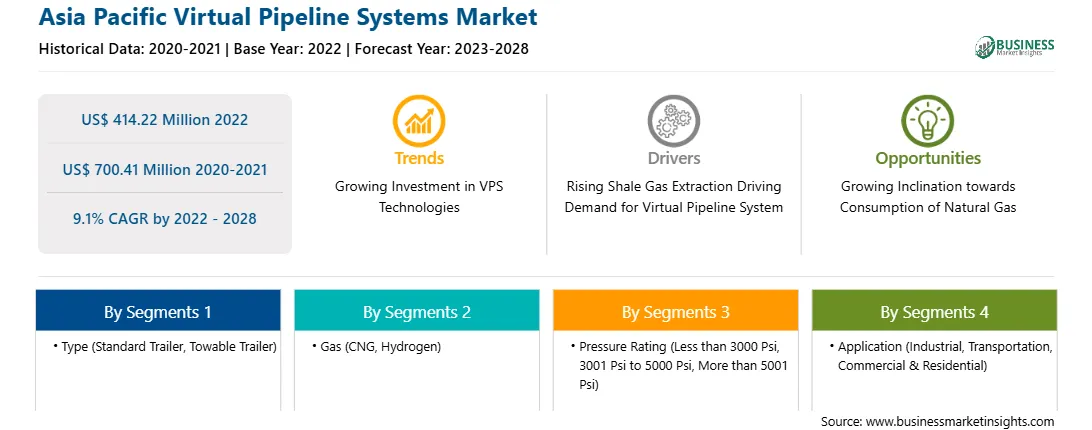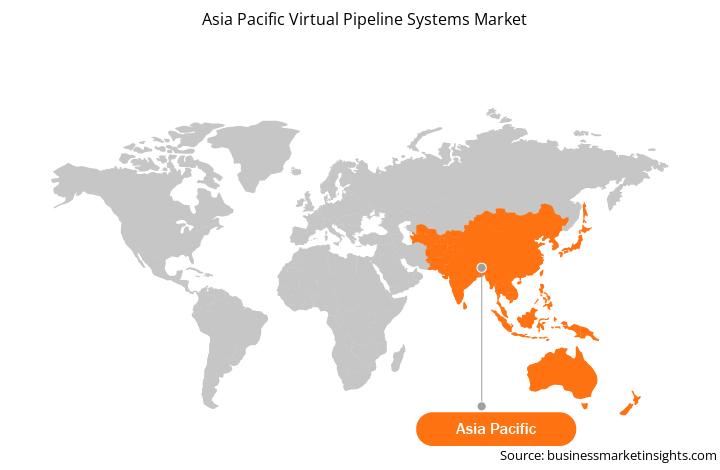The virtual pipeline systems market in Asia Pacific is expected to grow from US$ 414.22 million in 2022 to US$ 700.41 million by 2028. It is estimated to grow at a CAGR of 9.1% from 2022 to 2028.
Growing Inclination towards Consumption of Natural Gas
Increased investments in natural gas research and development by oil & gas and energy businesses are anticipated to provide significant growth opportunities for the future growth of companies in the virtual pipeline system market. These R&D activities are mainly driven by their goal of promoting the use of low-emission natural gas products. Virtual pipeline vendors focus on technology innovations, new product launches, product approvals, and geographic expansion to capture larger consumer and market base volume. Furthermore, Asia Pacific countries have significantly transitioned towards natural gas consumption. For instance, Malaysia is on course to becoming an LNG bunkering hub, with Petronas' first LNG bunkering vessel (LBV). Malaysia is also expected to increase gas supply via its virtual pipeline system (VPS). In September, national gas company Petronas launched its first LNG VPS solution in Peninsular Malaysia via the regasification terminal in Pengerang, Johor. This follows the earlier success of micro-LNG VPS facilities by Sabah Energy Corp at the Kota Kinabalu Industrial Park (KKIP) that serves the Sabah state. Hence, the rising transition toward natural gas is anticipated to create lucrative opportunities for the virtual pipeline system market. Further, aging pipeline infrastructure has been a major concern for governments across the region. As a result, they are striving to find alternatives to the conventional methods of oil and gas transportation. Hence, strict government regulations for ensuring environmental protection from carbon emissions and oil spills are anticipated to create lucrative opportunities for the virtual pipeline market vendors.
Market Overview
China, India, South Korea, Japan, and Australia are among the key economies in APAC. The swift developments in technologies, favourable initiatives by governments, digitalization of economies, and increasing disposable income of the middle-income class group are among the factors propelling the region's overall economic growth. As a result of the massive network of CNG stations, the country has a sprawling virtual pipeline network. China and India are projected to be major natural gas consumers owing to their focus on creating a cleaner environment. Energy consumption of APAC is anticipated to rise by up to 48% by 2050. The IEA projects that China will lead the Asia Pacific energy consumption with a share of 30% by 2025. The natural gas imports of the country have been rising steadily and would reach 138.371 cm in 2020. CNPC, China National Offshore Oil Corporation, and other state-owned businesses in China have plans to increase output at nearby gas fields, increasing the demand for pipelines in the area. India is also updating its gas pipeline infrastructure to be able to effectively meet the rising energy demand. The Indian government planned a pipeline project for the union territory of Jammu and Kashmir in the annual budget for 2021. The country also expects to invest US$ 66 billion in the construction of the gas infrastructure, which includes gas pipelines, compressed natural gas (CGD), and LNG regasification terminals. It further intends to increase the share of natural gas in the energy mix to 15% by 2023. In December 2020, the Indian government announced an investment of US$ 60 billion for building gas pipeline infrastructure for the extension of CGD pipeline networks in 232 different regions in the nation by 2024. Thus, the expansion of pipeline infrastructure and rising demand for virtual pipeline system. are the key contributors to the growth of the virtual pipeline system market in APAC. In October 2019, Gas Malaysia Virtual Pipeline Sdn Bhd (GMVP) and Kulim Green Energy Ventures Sdn Bhd signed a gas purchase agreement. Kulim Green Energy Ventures Sdn Bhd is a joint venture between Kulim (M) Bhd, O'Rec IND Sdn Bhd, and MTC Engineering Sdn Bhd. According to the agreement, GMVP would purchase biomethane from Kulim Green Energy for injection into the Natural Gas Distribution System (NGDS) network of Gas Malaysia. The company plans to convert palm oil mill wastewater into biomethane, which would then be upgraded to NGDS network natural gas specifications. Such agreements and collaborations between energy companies are further expected to support the virtual pipeline system market growth in APAC countries in the coming years.
Asia Pacific Virtual Pipeline Systems Market Revenue and Forecast to 2028 (US$ Million)
Strategic insights for the Asia Pacific Virtual Pipeline Systems provides data-driven analysis of the industry landscape, including current trends, key players, and regional nuances. These insights offer actionable recommendations, enabling readers to differentiate themselves from competitors by identifying untapped segments or developing unique value propositions. Leveraging data analytics, these insights help industry players anticipate the market shifts, whether investors, manufacturers, or other stakeholders. A future-oriented perspective is essential, helping stakeholders anticipate market shifts and position themselves for long-term success in this dynamic region. Ultimately, effective strategic insights empower readers to make informed decisions that drive profitability and achieve their business objectives within the market. The geographic scope of the Asia Pacific Virtual Pipeline Systems refers to the specific areas in which a business operates and competes. Understanding local distinctions, such as diverse consumer preferences (e.g., demand for specific plug types or battery backup durations), varying economic conditions, and regulatory environments, is crucial for tailoring strategies to specific markets. Businesses can expand their reach by identifying underserved areas or adapting their offerings to meet local demands. A clear market focus allows for more effective resource allocation, targeted marketing campaigns, and better positioning against local competitors, ultimately driving growth in those targeted areas.
Asia Pacific Virtual Pipeline Systems Strategic Insights

Asia Pacific Virtual Pipeline Systems Report Scope
Report Attribute
Details
Market size in 2022
US$ 414.22 Million
Market Size by 2028
US$ 700.41 Million
CAGR (2022 - 2028) 9.1%
Historical Data
2020-2021
Forecast period
2023-2028
Segments Covered
By Type
By Gas
By Pressure Rating
By Application
Regions and Countries Covered
Asia-Pacific
Market leaders and key company profiles
Asia Pacific Virtual Pipeline Systems Regional Insights

Asia Pacific Virtual Pipeline Systems Market Segmentation
The Asia Pacific virtual pipeline systems market is segmented into type, gas, pressure rating, application, and country.
Based on type, the market is segmented into standard trailer and towable trailer. The standard trailer segment held a larger market share in 2022.
Based on gas, the market is segmented into CNG, hydrogen, and others. The CNG segment held the largest market share in 2022.
Based on pressure rating, the market is segmented into less than 3000 Psi, 3001 Psi to 5000 Psi, and more than 5001 Psi. The 3001 Psi to 5000 Psi segment held the largest market share in 2022.
Based on application, the market is segmented into industrial, transportation, and commercial & residential. The transportation segment held the largest market share in 2022.
Based on country, the market is segmented into China, Japan, India, South Korea, Australia, and the Rest of Asia Pacific. China dominated the market share in 2022.
Galileo Technologies S.A.; Bayotech, Inc.; Petroliam Nasional Berhad (PETRONAS); RAG Austria AG; Quantum Fuel Systems LLC.; Chart Industries, Inc.; SHIJIAZHUANG ENRIC GAS EQUIPMENTCO.LTD; Fiba Technologies Inc.; Hexagon Agility; and Composite Advanced Technologies, LLC are the leading companies operating in the virtual pipeline systems market in the region.
The Asia Pacific Virtual Pipeline Systems Market is valued at US$ 414.22 Million in 2022, it is projected to reach US$ 700.41 Million by 2028.
As per our report Asia Pacific Virtual Pipeline Systems Market, the market size is valued at US$ 414.22 Million in 2022, projecting it to reach US$ 700.41 Million by 2028. This translates to a CAGR of approximately 9.1% during the forecast period.
The Asia Pacific Virtual Pipeline Systems Market report typically cover these key segments-
The historic period, base year, and forecast period can vary slightly depending on the specific market research report. However, for the Asia Pacific Virtual Pipeline Systems Market report:
The Asia Pacific Virtual Pipeline Systems Market is populated by several key players, each contributing to its growth and innovation. Some of the major players include:
The Asia Pacific Virtual Pipeline Systems Market report is valuable for diverse stakeholders, including:
Essentially, anyone involved in or considering involvement in the Asia Pacific Virtual Pipeline Systems Market value chain can benefit from the information contained in a comprehensive market report.